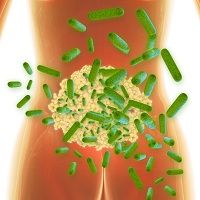Searching for Rheumatoid Arthritis in the Gut
A pair of recent studies look in an interesting place to find commonality among rheumatoid arthritis sufferers: their guts.

A pair of recent studies look in an interesting place to find commonality among rheumatoid arthritis sufferers:
Their guts.
Both co-authored by Veena Taneja, PhD, of the Mayo Clinic’s Center for Immunized Medicine, the two studies both looked to see how bacterium in the gut might be related to rheumatoid arthritis, and both involved mice. The first, published in Genome Medicine in April, sought to find a biomarker in the form of gut microbiota. Examining fecal samples of (human) RA patients and their first-degree relatives, the researchers noticed that an abundance of collinsella in the gut was linked to increased RA symptoms.
To test this, they administered collinsella to “humanized” mice, and found that “Mice given [Collinsella aerofaciens] developed arthritis with increased incidence and severity compared with non-treated mice (100 % incidence in treated vs 62.5 % in untreated, P = 0.068).” Their findings indicate that collinsella may be a predictive biomarker for RA in humans.
The second study, accepted in June to Arthritis and Rheumatology, attempted to find out if a commensal bacterium could actually alleviate RA symptoms. Prevotella histicola, evident in a healthy human gut, was administered to mice, who were then monitored against an untreated control group. “Treatment with P. histicola led to reduced intestinal permeability by increasing expression of enzymes that produce antimicrobial peptides,” said the study, essentially that the healthy bacterium promoted mucosal regulation. Treated mice exhibited decreased symptoms of inflammatory conditions than untreated mice.
RA is, above all else, an autoimmune disorder, in which a body’s immune system decides to attack its own healthy cells. With this in mind, it is both fascinating and fitting that it may be tied to the goings-on in the gut, where so much of our vital immune regulation takes place.